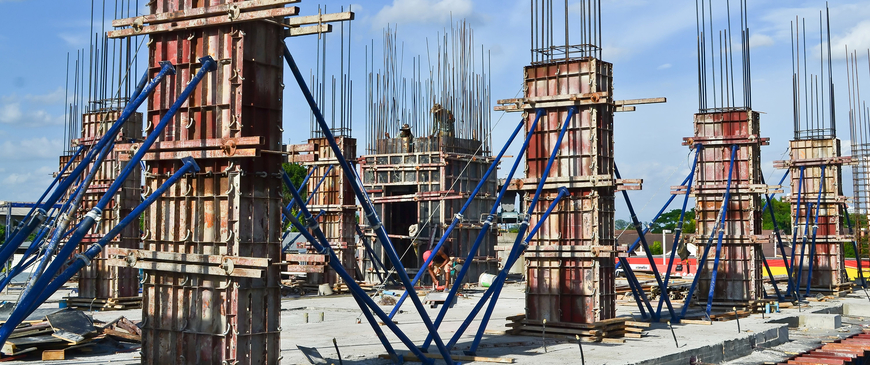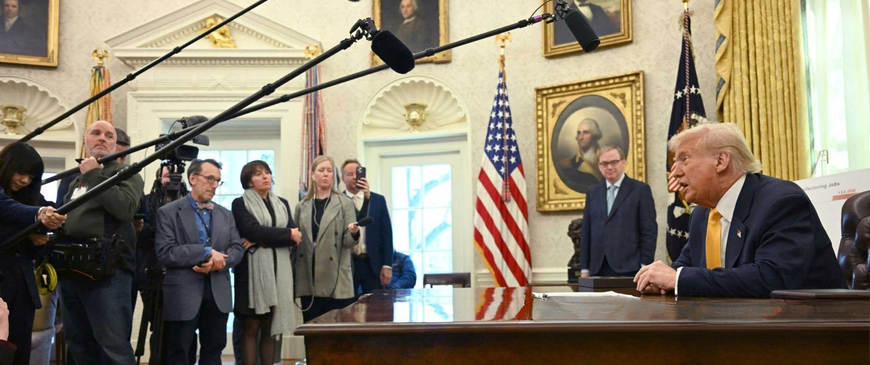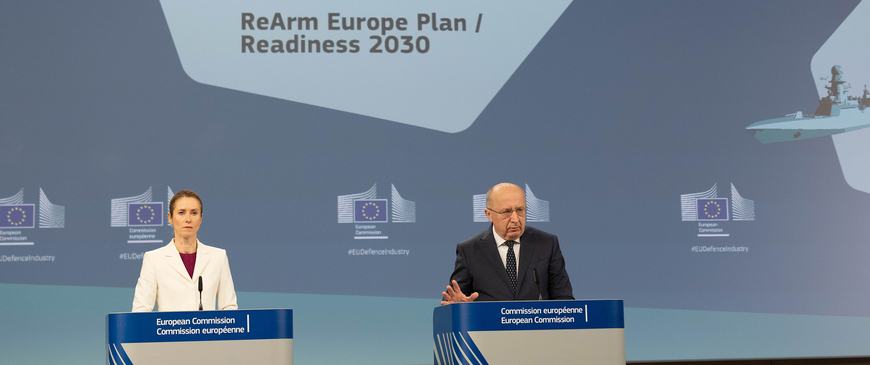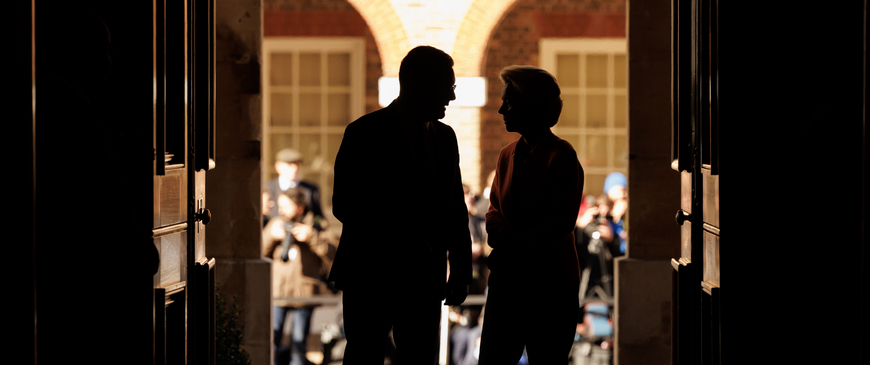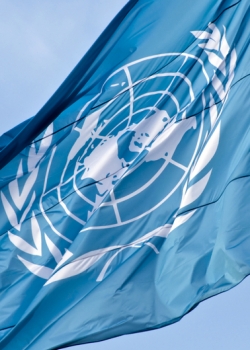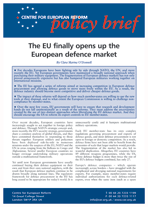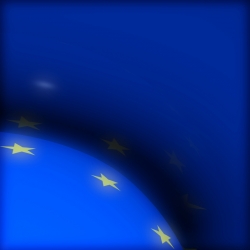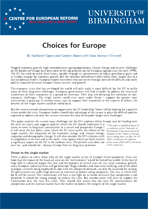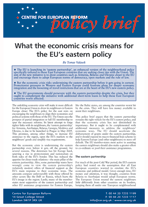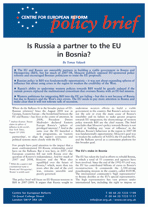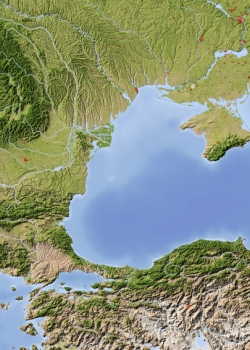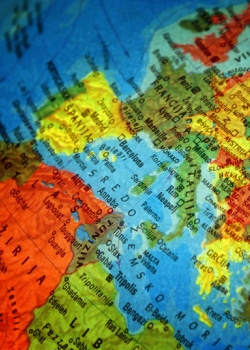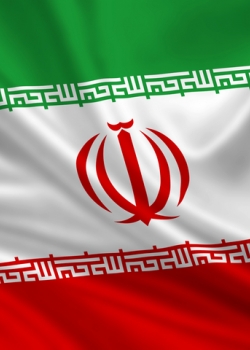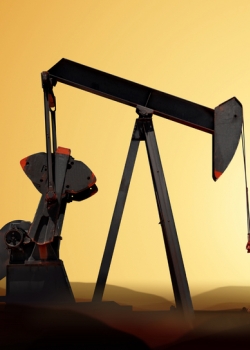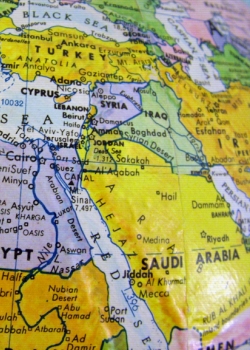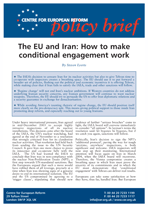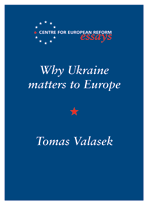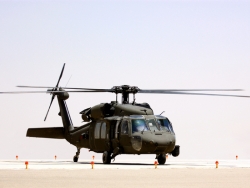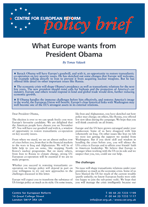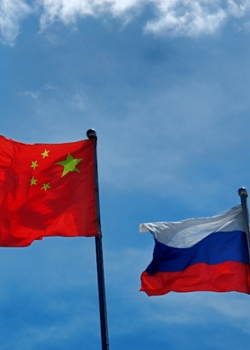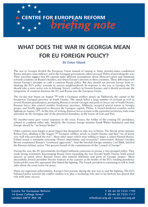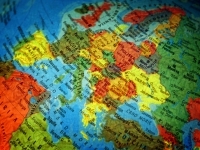Foreign policy & defence
The EU should do more to support UN peacekeeping in Africa
01 June 2009
The EU likes to highlight its commitment to tackling failed states, addressing humanitarian disasters and bringing order to unstable regions.
The EU finally opens up the European defence market
01 June 2009
For decades Europeans have been fighting side by side. Yet governments have maintained a broadly national approach when purchasing their military equipment.
Making a success of the EAS
21 May 2009
If the Irish people vote yes to the Lisbon treaty at the second attempt, and the Czechs, Germans and Poles also ratify, the EU will set up an ‘external action service’ or EAS. This new institution promises to make the Union’s common foreign and security policy more effective.
Choices for Europe
01 May 2009
CER - University of Birmingham
Sluggish economic growth, high unemployment, ageing populations, climate change and security challenges on the borders of Europe have been some of the top priorities on the European agenda since the early 1990s. The EU has tried to tackle these issues, notably through its commitments to reduce greenhouse gases and its Lisbon strategy for economic growth.
What the economic crisis means for the EU's eastern policy
01 April 2009
The EU's new 'eastern partnership' risks being undermined by the economic crisis. The initiative offers countries like Armenia and Ukraine fresh incentives, such as free-trade agreements and easier visa regimes, to adopt European norms of democracy and open markets.
Is Russia a partner to the EU in Bosnia?
19 March 2009
Where does Bosnia fit in the broader picture of EU – Russian relations? The EU and Russia are ostensibly partners in building a viable government in this Balkan country, but for much of 2007-08 Russia encouraged Bosnian politicians to resist EU-sponsored police reforms. This policy brief argues that Russian policy...
Economic crisis and the 'eastern partnership'
10 March 2009
In two months, at a summit in Prague on May 7th 2009, the European Union will launch a new policy for Eastern Europe – an 'eastern partnership'.
Why enlargement is in trouble
24 February 2009
It is five years since the EU admitted eight Central and East European countries, followed by another two in 2007. To celebrate this anniversary, Commissioner Olli Rehn has just released a report that explains how these countries have benefited from integrating into the EU. But any jubilant mood was dimmed by the current economic crisis in Central and Eastern Europe; and by the bleak outlook for further accessions.
Georgia, Ukraine and energy security
02 February 2009
In January 2006 Russia interrupted gas supplies to Ukraine and triggered a short, sharp shock to Europe in its ever-growing dependency on Russian gas.
Obama, disarmament and Iran
02 February 2009
Barack Obama has pledged to take steps to rid the world of nuclear weapons. “I will not authorise the development of new nuclear weapons. And I will make the goal of eliminating nuclear weapons worldwide a central element of US nuclear policy”, he wrote in December 2008.
Issue 64 - 2009
30 January 2009
- Why global energy markets need governing, Nick Butler
- Georgia, Ukraine and energy security, Dieter Helm
- Obama, disarmament and Iran, Tomas Valasek
Gaza, Europe and empty gestures
08 January 2009
'We're fed up with empty gestures', the Israeli prime minister told a high level delegation from the EU. Several foreign ministers and EU officials had come to the Middle East to try to help end the war raging in Gaza between Israel and Hamas, which has killed over 700 Palestinians and 10 Israelis in the twelve days since it started.
The EU and Iran: How to make conditional engagement work
19 December 2008
The IAEA's decision to censure Iran for its nuclear activities but also to give Tehran time to co-operate with inspectors creates a breathing space. The EU should use it to put forward a broader set of policies, fleshing out the political and economic incentives it is offering Tehran, while making...
Why Ukraine matters to Europe
05 December 2008
Until the war in Georgia in August 2008, the EU had taken stability beyond its eastern border for granted. Now it will need to become more active in this volatile region, in which Ukraine is the largest and most important country.
The EU takes on defence procurement
28 November 2008
The EU is in the middle of a little noticed – but potentially important – debate about defence markets. For the first time, the European Commission could be authorised to help reduce barriers amongst the EU’s segmented national defence markets.
What Europe wants from President Obama
27 November 2008
Barack Obama was the preferred candidate of most Europeans. He will have Europe's goodwill and with it, a window of opportunity to restore transatlantic co-operation on key security issues. Whether he succeeds will depend in part on the president-elect's willingness to try out new approaches to key foreign policy challenges.
Russia, China and the Georgia dimension
01 October 2008
Russia’s relations with the West today are more problematic than at any time since the fall of the Berlin Wall. With talk of a new Cold War and of parallels with the great power rivalries that preceded the First World War, Moscow’s ‘strategic partnership’ with Beijing has been out of...
The Arab-Israeli conflict: France's dashed hopes
03 September 2008
During a trip to Israel in August, the only optimists I met were French diplomats. The reason for their upbeat mood? Ambitious plans by President Sarkozy for the EU to advance the Middle East peace process – including a controversial proposal that the EU should take the lead in creating an international peacekeeping force which could replace the Israeli army in the West Bank as part of a peace deal. But in the current inauspicious environment, can France, which currently holds the EU presidency, really help to move things forward and allow the EU to play a bigger role in the peace process? ...
What does the war in Georgia mean for EU foreign policy?
15 August 2008
The war in Georgia divided the European Union instead of uniting it. Some member-states condemned Russia and gave (non-military) aid to the Georgian government; others accused Tbilisi of provoking the war.
Farewell, Polish plumber
07 August 2008
When the EU expanded its membership in 2004, the UK was one of only three EU countries – Ireland and Sweden were the others – fully to open its borders to migrants from the ten new member states.

